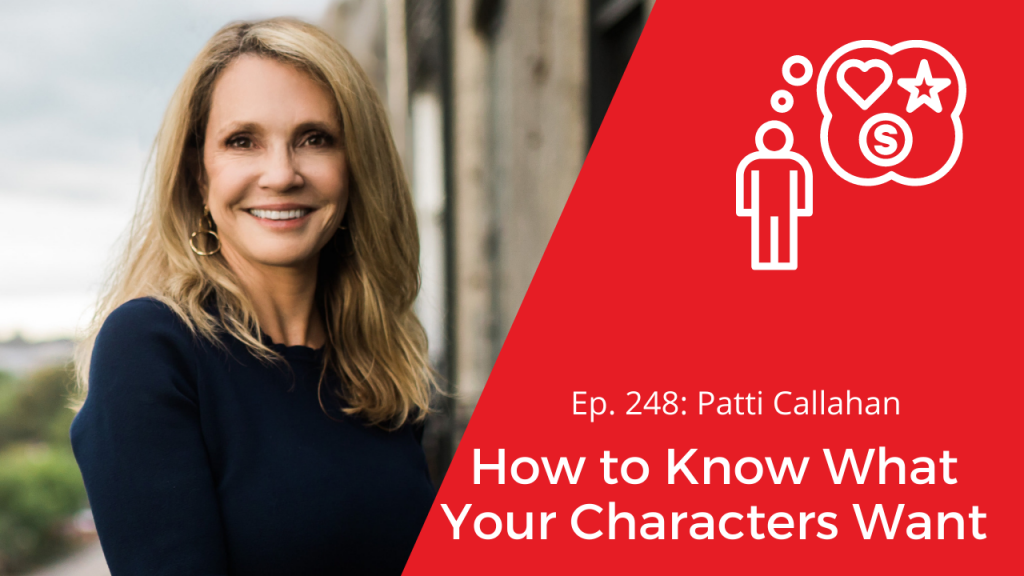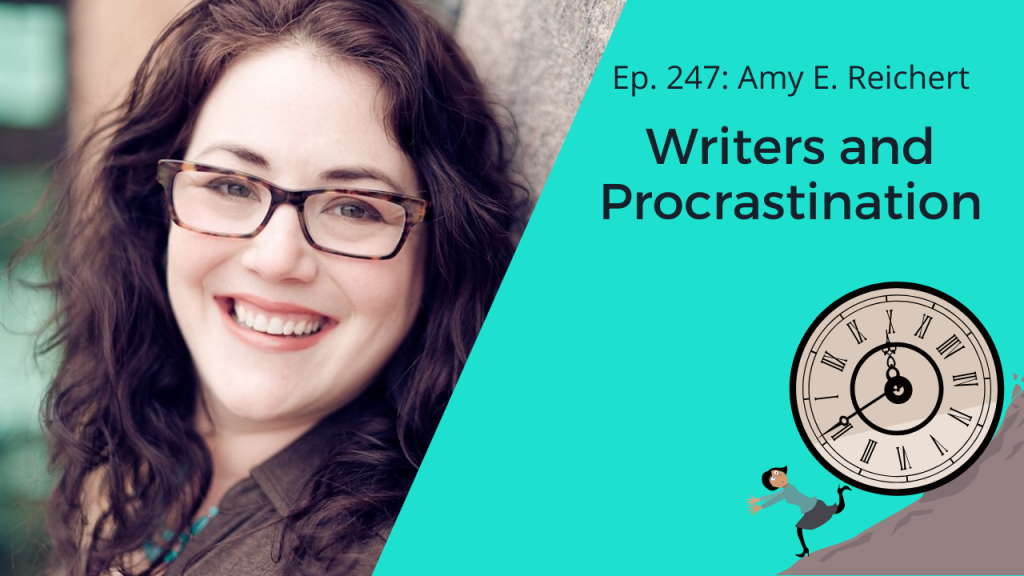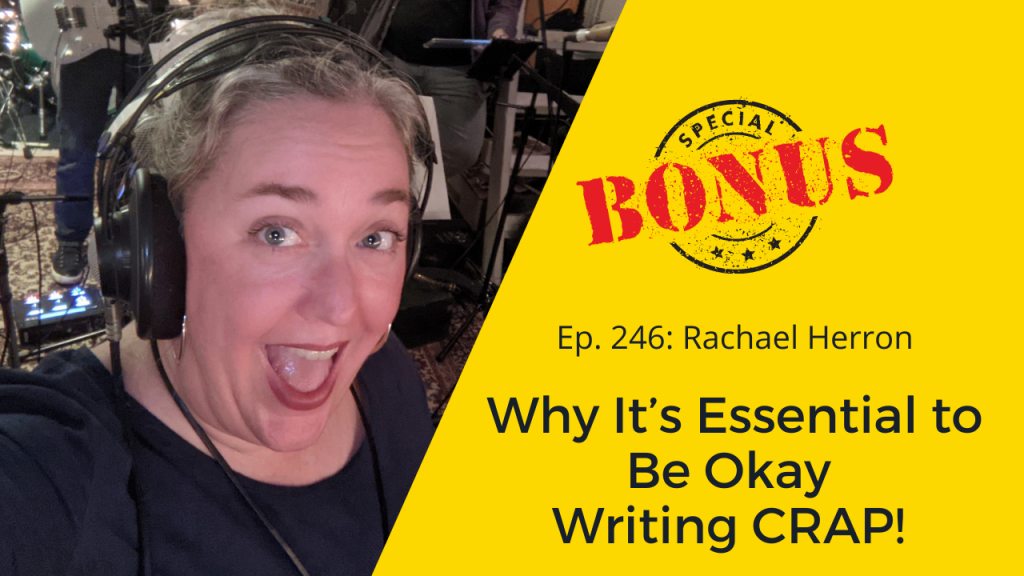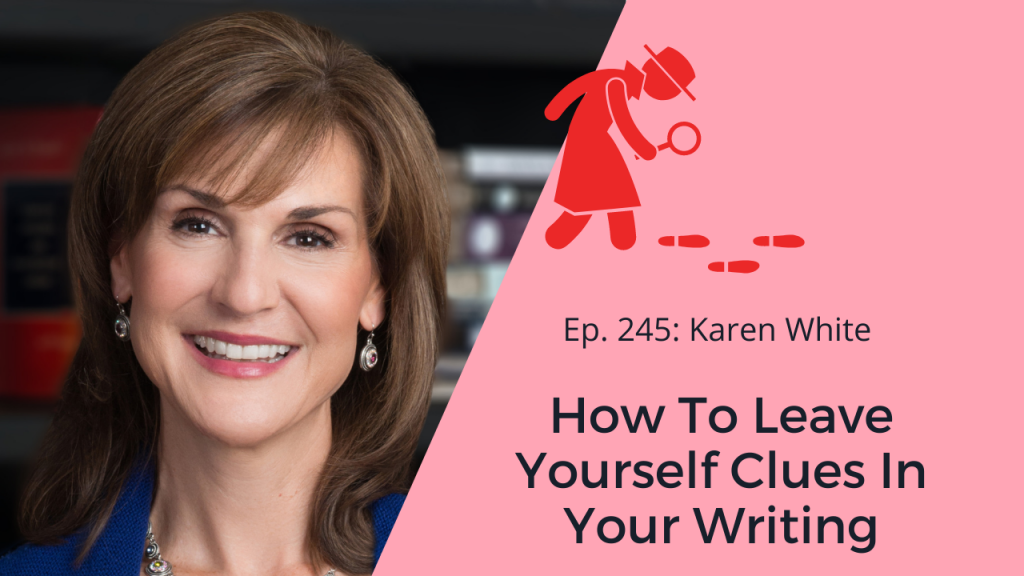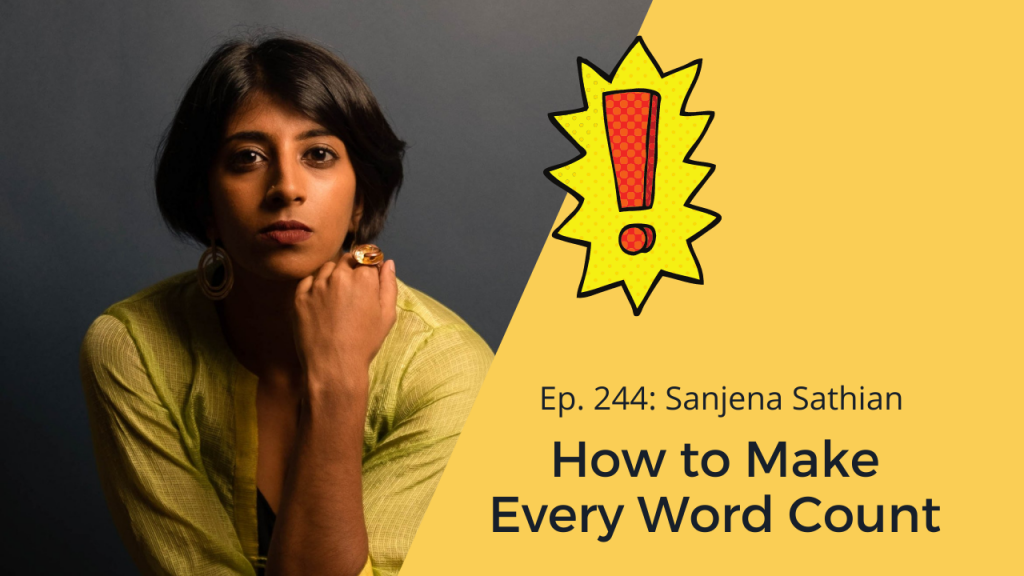In this bonus mini-episode, Rachael Herron talks about what she’s found to be the best platform-building tools for writers.
Also covered:
- Turning your book into a screenplay
- What if your book just isn’t as strong as you’d like yet
- How do you handle not being historically accurate?
Go HERE to get Rachael to be your mini-coach!
Join Rachael’s Slack channel, Onward Writers!
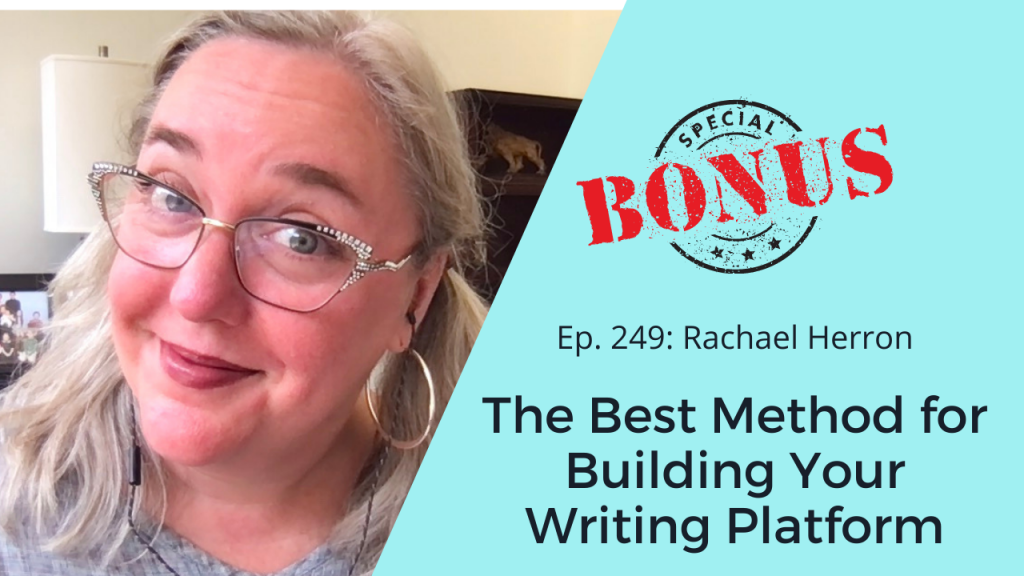
Transcript:
Rachael Herron: [00:00:00] Welcome to “How do you Write?” I’m your host, Rachael Herron. On this podcast, I talk to authors about how they write, what their process is and how their lives fit together. I’ll keep each episode short so you can get back to writing.
[00:00:16] Well, Hello writers! Welcome to episode #249 of “How do you Write?” I’m Rachael Herron. Thrilled you’re here with me today on this mini bonus episode, which I’m just going to try to do more of. If you are a Patron of mine at the $5 or up level a month, not only do you get all the essays that I write, and right now I’m writing about, moving, and fear, and courage, and how both of those things feel in the body, but you get to have me as your mini coach and you get to ask me any questions. I’m finishing up all the questions right here. Got a couple of questions and then it will have no more. So you mini coaching clients, please send me some and I’ll be doing more of these videos, which I really, really love to do. [00:01:07] So, right now, just a little catch up. I am doing this right after I filmed the last episode. So I’m still in Idaho as we speak. Although when you get this, I will be one day away from leaving the United States of America and moving to New Zealand. We leave tomorrow as this is released. So perhaps when you listening to it on crying on an airplane, somewhere over the Pacific. Anything is possible. I have reached a really deep level of happiness though, and acceptance and excitement about this. Finally, the fear is almost gone. I’m sure there will be more of it in the days to come, but, we’ve done all the things we’ve sold the house, we’ve sold the cars, everything we own is in suitcases. And now all we have to do is live and follow our noses to where they feel like going. And that’s super exciting and I’m just tremendously overwhelmed by this feeling of anticipation and also deep happiness in the moment which is the most important thing. I’m not trying to get anywhere. Yes, we are going to New Zealand, but I don’t have an idea of what that’s going to look like or what it needs to be. [00:02:21] It is just going to be what it should be. And what matters is this moment sitting in this particular co-working space in Idaho and how it’s a little bit hot in here and a little bit muggy, which is impossible in place. I don’t know how that’s happening. But I know that after I record this, when I go home tonight, we’re going to have Mexican food. And at this moment I really am enjoying the width and the height of this desk that I’m sitting at it’s really, really good, fits my body. I’m enjoying the incredible speed of the internet. That’s what’s going on for now. And it’s good. So, just for one second, why don’t you take a moment to think about where you are? How does your body feel? How’s your back feel? How does your brain feel as I’m talking to you? What’s going on in this very minute, what can you see? What can you taste? What is good right now? What is difficult right now, what hurts? Acknowledge that, I’m going deep and really, I meant to just answer questions. [00:03:26] So, but do take a minute to maybe think about what you are glad of in this moment and it doesn’t have to be just good things. You can be glad about hard things too. So, I am glad that I’m with you here in this moment, in a very cool kind of time, travel way and all right, let’s jump into the questions. We can go less metaphysical and into the nitty gritty of writing. [00:03:52] Okay, so this first question, and the second question are from Maggie. How rude my cell phone is still on, I’m turning that off. Okay. All right. She says I’m in the process of drafting my first complete novel, where the romance between the two central characters is both of the theme and the main story I want to tell. I have a solid premise and I know my characters inside and out. Still, I’ve struggled to develop the finer points of my plot in a way that supports my character’s development while also keeping the story moving in an interesting and satisfying way. My concern is that my plot devices will feel forced and inadequate. Do you have any advice on crafting a story driven plot without over complicating the heart of the story? And then it goes on to ask a different question. I want to answer this one first. [00:04:43] So, you’re in the process of drafting your first complete novel of this particular book. And I would just like to reassure you and everyone listening that the finer points of your plot will be awkward and weird and wrong and flat and strange, you want them to move in an interesting and satisfying way. They will not, they will move in a dull, boring and completely unsatisfying way. That’s a first draft’s job. It’s also sometimes even a second draft’s job and the more we get comfortable with allowing our books to really just suck the big one. The closer we get to being able to create books that satisfy us completely, that satisfy every single thing that we want them to do. First, they have to be written wrong. And, that is a truth that is just gonna continue to be a truth for the rest of our lives as writers. So it’s kind of liberating, isn’t it? In a first draft or sometimes even a second draft, what we do in the book is just, it just feels bad. It just feels wrong because said with love, it is it’s not good enough yet, but you can’t make it good enough until the book is written. There’s no way, right, there are a few exceptions to this. I’ve known like I, and I’ve told- I’ve said this before, I have known four or five professional writers with, you know, 30 or 40 books under their belts who go through the book and they make the book good as they go. That is less than 1% of the writers that I know. The rest of us cannot make chapter six. Good. And then go on to chapter seven, we just write chapter six and it’s bad, and it is not interesting and it is clumsy and wrong. [00:06:44] And then we go on to chapter seven and we have to do it that way. Ninety nine point- I’m going to say 99.3% of writers have to do it that way. If you think you’re not that kind of writer, and maybe this is not you, I’m not talking to you because I know you and you’re not this kind of writer, but if you think you are the writer who has to get it right before moving forward, that is only your method if you are regularly completing good books that you are proud of, if you are not, and you think that that is your method. That’s not true. You’re wrong. Your method is to write a crappy first draft and get to the end and then revise it just like everybody else. The only way that you know, that is your method, that perfectionist method of making a chapter good and then moving on to the next one and then making that good and then moving onto the next chapter is if you are regularly completing good books. So that is a really useful test to see if you are in that .7% of people who can do that, are you doing it? Then that’s you, if you’re not doing it, then you’re just like the rest of us. [00:07:44] So going back to Maggie and her question, the next part of that is my novel is loosely inspired by sensitive and important events in history. However, my goal and vision is not to write historical fiction. What are your thoughts on how to be sensitive to historical themes without needing to make sure I’m being historically accurate in my representation of the events? So this is great. I think a lot of writers struggle with this because history is important. It is important, it’s how we got here. History it’s how I got here, it’s how you got where you are, history matters and you mentioned the word sensitive, which means that these are probably historical events that perhaps have two different sides as most historical events do. And what I like to recommend when writing historical events is to hold them with a loose hand, move stuff around. If you want to, there are some writers who really, really, really want to be historical writers and getting the history in the right place. On the right day, at the right time of day with the right weather is going to be very important to them. [00:08:55] And that is perfectly fine. However, you’re currently saying your goal is not to be a historical writer is to tell this story of these characters. So hold it loosely. If you need to move stuff around, allow yourself to do so. And then, before the book is published you just get to put in that magic line at the beginning of the book that, or at the end of the book that says some historical events have been moved or changed in order to suit my story. There. You’re in the clear, the average reader who doesn’t know much about these events will be learning from your events even if you have changed some things, they’re learning deep lessons from what you are showing them and the avid historical reader, who knows every single thing about this particular battle and where it occurred and who died first, who died second, who won, who lost? They will be comforted by the sentence that says, I know the history and I’m choosing to change it, to suit my story. And you get to do that. You are allowed. And in fact, I encourage you to do that because I think that’s really fun. [00:10:01] All right. Next question of all the different methods you have tried newsletter, social media, promotions, podcasting, et cetera, which one has been the best for building your platform/finding your specific readers/fans? What in the early years of your writing career, pre-published, to a few books published, do you wish you had done more of, or less of? Okay, so I have two answers for this because I have two different basis of readers. I have the writer base, people who come to me to hear podcasts like this, to talk about writing, to talk about how to complete books and how to get out of their own damn way and get their work done. So that has a particular niche of people. The best thing that I have done in finding them is podcasting reliably for more than five years now. This is episode 249 and that’s awesome. That’s a lot of freaking podcasts for, I dunno, three or four years. I did the Writer’s Well podcast with J. Thorn that also increased my visibility as a teacher of writing. Probably another thing I did that really got me to know a lot of people was teaching both at Stanford and Berkeley and having that kind of word of mouth. And that’s how writers have found me as a person to listen to and ask questions of. So podcasting is probably my primary purpose for that, but if you, but for my readers, for finding readers of my fiction and of my memoir that I write, this was such a good question. [00:11:44] What I wish I had focused on earlier is the thing. I always encourage everyone to focus on as early in their careers as they can. I wish I had been building my mailing list as early as possible. And I was to a certain extent, I did have a mailing list that readers could join before my first book came out and I was able to do that because I was a regular and reliable blogger. I started blogging in 2002, so almost 20 years now. And I had a quite large readership on the blog. So I was able to move those readers over onto my email newsletter list for the books that I write. And a lot of those people liked the books that I wrote. So they came along with me on that newsletter experience. However, I didn’t do a great job of catching the people who read the first few books and in part that is because those books were traditionally published. And at the end of a traditionally published book, those were from Harper Collins, my first five or so books were Harper Collins. And at the end of the book, they say, please sign up to follow Rachael Herron. And then they give you the Harper Collins website to follow Rachael Herron’s books at Harper Collins. I didn’t get any of those email addresses. It’s hard to do if you’re traditionally published because the publisher wants those email addresses too. They know how valuable they are, but set up a phone and I’ll say it again. The most valuable thing you can do as a writer is to get those email addresses for yourself. Not Facebook, not Twitter, not Instagram, not TikTok, getting followers on that is fine. [00:13:24] If you love doing that, great. But the only thing you own, you really own that is yours are those opt in newsletter subscribers never, ever, ever, ever, ever, ever, ever, ever, ever, ever put anyone under newsletter, even if they’re your best friend without asking. That’s just something that I will always, always say, if you and I have been friends forever, don’t put me on your email newsletter without asking me if you ask me, I will say yes, if you don’t ask me suddenly we are not friends anymore. And I will send your email to spam and that’s just not good. I mean, that is just one of those things that everyone hates. So you want opt in newsletter subscribers. People who have said I like you. And I am choosing to ask to continue to hear more about you. That is the number one most important thing to have. [00:14:18] I think number two, most important thing to have is just a place on the internet where you can be found. You own your own website. So that is the most, that’s the safest place to have. If you are a blogger and like blogging, do that. That’s a great way to go because then your voice is out there and people are finding you organically through search engine optimization, talking about the things you’re writing about, and then they have an option to follow you and people do. That’s the weird thing is people sign up for newsletters, but that’s true of me too. When I find something, a voice that I like, the first thing I do is I sign up for their newsletter. Often I unsubscribed after a while because either they aren’t who I wanted them to be or what I thought they were going to be. But I give a lot of newsletters, a try and certain newsletters I just absolutely love and don’t ever want to be off of, and you want to be that person and you want to be find-able. However, I will say about blogging. You do not have to blog at all. Only blog if it is something that you are passionate about doing and know that if you’re starting a blog, it’s going to be probably years before you gain traction and a large readership. So again, only do it if you love doing it. [00:15:30] Otherwise my take on social media. It’s changed a little bit. I’ve always said that you don’t have to build up any kind of social media following before your books come out because publishers would love it if you had a Kim Kardashian following, but they don’t expect you to. However, that’s changed recently to say that I don’t think you have to have a lot of followers, period, but you should be visible on the major platforms. You should be find-able and you should not be an asshole. Publishers are going to check. Agents are going to check. They are going to search for you on Instagram, Facebook, maybe Twitter. And if they find that you’re out there trolling or saying negative things to other people, they will immediately ignore you. They will send your email to delete. They don’t want to work for the person like that. They also want to see you out there interacting kindly with other people, maybe with writers, maybe with readers, maybe with just your friends that you went to high school with. Be visible on at least one platform perhaps. [Read more…] about Ep. 249: The Best Method for Building Your Writing Platform